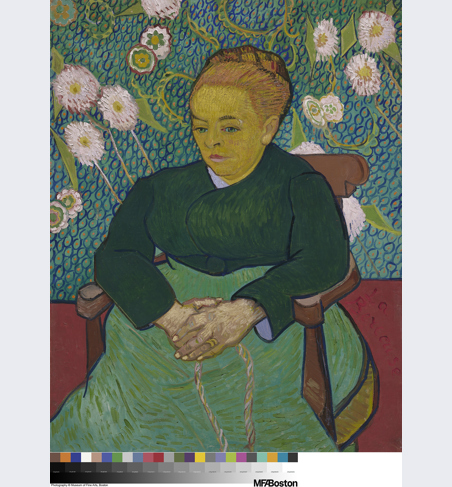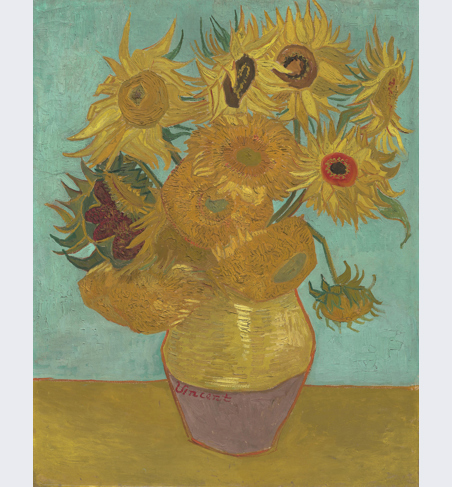The National Gallery
14 September 2024 ‒ 19 January 2025
One of Vincent van Gogh’s 'Sunflowers' paintings from Arles in France is to travel outside the United States for the first time since it was acquired in 1935 – offering the unique opportunity to realise one of Van Gogh’s ideas for a decorative arrangement.
The picture, now at Philadelphia Museum of Art, will be lent to the National Gallery’s exhibition Van Gogh: Poets and Lovers (14 September 2024 ‒ 19 January 2025), where it will be seen alongside the Gallery’s own Sunflowers painting for the first time since early 1889 when they were in the artist’s studio.


The Philadelphia 'Sunflowers' was left initially with Van Gogh's friends, Mr and Mrs Ginoux in Arles and was bought by Mr Carroll Tyson, of Chestnut Hill Philadelphia, in 1935, before being acquired by the Philadelphia Museum of Art in 1963. The London 'Sunflowers' was sent to Van Gogh’s brother Theo in May 1889 and stayed in the family until the National Gallery bought the picture in 1924. The two pictures were never been exhibited together and, therefore, were in the artist’s studio when they were last together in early 1889.
While the National Gallery Sunflowers was painted in August 1888, the Philadelphia version was executed in Arles in January 1889, reaffirming the artist’s continued fascination with these still lifes.The two 'Sunflowers' will be shown flanking 'La Berceuse' (1889), his symbolic portrait of a woman with cradle cord, a very important loan from the Museum of Fine Arts, Boston, United States.
Months after he painted these pictures, while in Saint-Rémy, near Arles, Van Gogh discussed potential arrangements of them for display and sent a sketch to his brother Theo in a letter of late May 1889.
While in Arles, Van Gogh first painted several portraits of Augustine Roulin. He undertook a new interpretation in bold colours against a highly stylised floral background. The rope in her hands suggests a cradle beyond the confines of the frame. At right, the painter inscribed the title La Berceuse, which can be translated as ‘lullaby’ or ‘she who rocks the cradle.’
Writing to his brother he imagined his painting ‘in the cabin of a boat’ where fishermen in ‘their melancholy isolation, exposed to all the dangers, alone on the sad sea…would experience a feeling of being rocked, reminding them of their own lullabies.’
As well as marking the Gallery’s 200th anniversary this year, 'Van Gogh: Poets and Lovers' also marks the centenary of the Gallery’s acquisition of 'Sunflowers' as well as Van Gogh’s Chair (1888), two of its most famous pictures, in 1924.
The Gallery’s first exhibition devoted to Vincent van Gogh (1853‒1890) will also be the first anywhere to focus on the artist’s imaginative transformations. It will feature over 50 works and loans from museums and private collections around the world, including important pictures from the Kröller Müller Museum, Otterlo, Netherlands, the Van Gogh Museum, Amsterdam, and the Musée d’Orsay, Paris. Groups of Van Gogh’s most ambitious canvases and works on paper will explore the artist’s creative process and his sources of inspiration.
Dwelling on Van Gogh’s time in Arles and Saint-Rémy in Provence (1888‒1890), the exhibition investigates the artist’s fascinating practice of turning the places he encountered into idealised spaces in his art, thus crafting a deeply resonant and poetic framework for his oeuvre. The exhibition will also show how portraits played a vital role, as Van Gogh assigned his models symbolic meaning within his artistic universe such as the Poet and Lover of the exhibition’s title.
'Van Gogh: Poets and Lovers' will explore how the poetic imagination and ideas associated with love evolved into central themes for the artist. In Arles, for example, Van Gogh designated the public park in front of the Yellow House (in which, in 1888, Van Gogh rented four rooms) as a Poets’ Garden, envisioning Italian Renaissance poets Petrarch and Boccaccio strolling there. Some of Van Gogh’s most glorious paintings and drawings of the time are associated with this idea, and pairs of lovers appear in paintings such as Starry Night (Musée d’Orsay, Paris, 1888).
In May and June of 1889, after Van Gogh was admitted to the Saint-Paul-de-Mausole hospital in Saint-Rémy, he imagined the asylum’s overgrown garden as a secluded site for lovers. He painted spectacular compositions depicting views of the grounds. The exhibition will show how this idealising, euphoric exploration of the asylum garden contrasts dramatically with works from the autumn when Van Gogh instead associated the very same location with his and his fellow patients’ sufferings.
In Arles, in late summer of 1888, Van Gogh planned to decorate his Yellow House with his pictures on the theme of the Poet’s Garden, the Sunflowers and the Poet and the Lover. These paintings were instrumental in his conception of a decorative scheme that quickly grew beyond the walls of the Yellow House. 'Van Gogh: Poets and Lovers' will show how the artist sought to create important compositions for exhibitions in Paris, initially in 1889, year of the Exposition Universelle, when he hoped to display them as a cohesive group alongside works by fellow avant-garde artists.
The exhibition will explore how Van Gogh’s choices for these works reflect his thinking about painting in series, his repeated references in letters to pendants, his use of opposites or contrasts to create harmony and cohesion. The artist continued to pursue these ideas later in Saint-Rémy, as his works became increasingly known in avant-garde circles.
As well as the many loans, the exhibition will draw on the artist’s works in the National Gallery’s collection. In addition to 'Sunflowers' and 'Van Gogh’s Chair', the Gallery owns other major paintings of great significance to the exhibition’s reassessment of Van Gogh at a key moment of his career: Wheatfield with Cypresses (1889) acquired in 1923, and Long Grass with Butterflies (1890), which entered the collection in 1926.
'Van Gogh: Poets and Lovers' is curated by guest curator Cornelia Homburg, and Christopher Riopelle, the Neil Westreich Curator of Post 1800 Paintings at the National Gallery, from an initial concept by Cornelia Homburg.
Dr Gabriele Finaldi, Director of the National Gallery, London, says: ‘This is the first exhibition devoted to Van Gogh ever held at the National Gallery. It marks two centuries of the Gallery’s existence and one since its acquisition of 'Sunflowers'. Museums and collectors have been astoundingly generous in lending great paintings to this show.’
